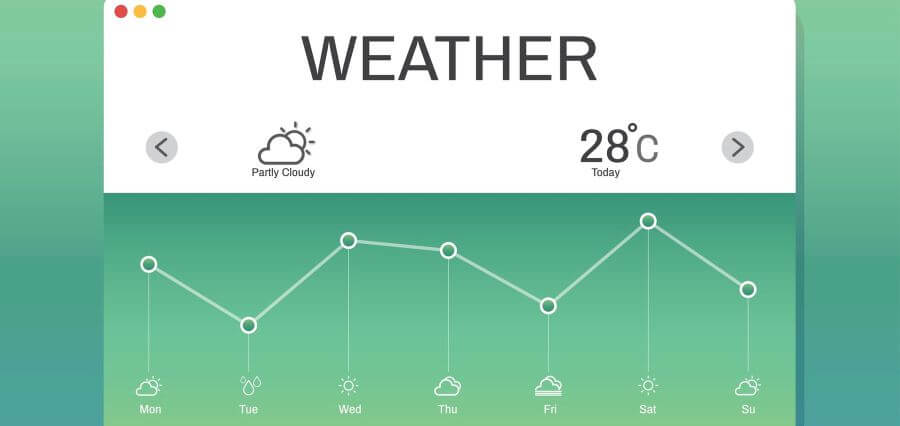Artificial intelligence has transformed many industries over the years by providing exceptional efficiency and accuracy. A notable field that has seen advancements due to AI is weather forecasting. Companies can now forecast weather patterns with enhanced accuracy through machine learning algorithms. This progress has proven to be an asset in improving daily operations across industries. This article delves into the benefits of incorporating AI-driven weather prediction to streamline operations and enable decision-making in business endeavors.
Exploring the Use of Artificial Intelligence in Weather Forecasting
AI weather prediction depends on algorithms that examine meteorological data sets instead of relying on conventional methods for predictions like in the past. By analyzing real-time data gathered from satellites and sensors along with records to detect weather patterns and trends accurately, this approach offers businesses weather predictions that can help them make informed decisions and enhance operational tactics.
Advantages in Agriculture
In farming practices, the weather impacts crop yields and how livestock are handled. AI-powered weather forecasting provides farmers with timely predictions, helping them better schedule their tasks. Agricultural operations can fine-tune planting schedules, irrigation requirements, and harvesting timing by predicting rain patterns, temperature changes, and severe weather occurrences. This forward-thinking strategy helps reduce damage to crops and boosts output levels to maintain a food source.
Improving Transportation and Logistics
The smooth functioning of transportation and logistics firms heavily depends on weather forecasts for planning and safe operations. Precise weather predictions assist these companies in organizing routes, coordinating schedules, and maintaining safety standards. Utilizing AI-powered forecasts enables transportation companies to predict disruptions caused by weather conditions. This feature empowers them to redirect vehicles, modify delivery schedules, and manage resources wisely. As a result, it leads to minimized delays, cost-effective measures, and improved customer satisfaction.
Enhancing Energy Control
Energy companies encounter difficulties in managing the equilibrium between energy availability and usage demands when weather conditions affect energy sources. Wind power generation systems utilize AI-powered weather forecasting aids to predict energy production accurately. Anticipating upcoming weather fluctuations enables energy suppliers to modify their production and storage strategies proactively, thereby ensuring an energy supply chain while minimizing resource wastage and promoting eco operations.
Improving Retail Operations
Retail stores can use AI weather forecasts to improve their stock management and marketing tactics by predicting consumer needs based on weather trends, like gearing up for winter clothes during spells or selling more outdoor gear when the sun is shining bright ahead of time to avoid unused items and running out of popular products in store hoping to engage customers better with tailored marketing strategies tied to the weather forecast, for increased sales.
Improving the Planning Process for Construction Projects
Often, delays occur because of weather conditions in construction projects. Artificial intelligence weather forecasting gives construction managers information about future weather events, which helps in planning construction activities efficiently to reduce downtimes and prevent project delays effectively by scheduling tasks based on favorable weather forecasts. This ensures optimal utilization of resources and labor, resulting in projects staying on schedule and within budgetary limits.
Backing Up Disaster Readiness
Accurate weather forecasting by AI is vital for preparing and responding to disasters, like hurricanes and floods, rather than reactively helping authorities plan evacuations and response strategies efficiently to minimize damage and save lives while enabling businesses and communities to protect their assets through early warnings.
Enhancing Tourism and Event Management
Tourism and event management heavily rely on weather conditions for planning and delivering exceptional experiences. AI-powered weather prediction can help tour operators and event planners anticipate and adapt to changing weather conditions. For instance, outdoor events like festivals, weddings, or guided tours can be scheduled around favorable weather windows, ensuring better attendee experiences. Similarly, travel agencies can tailor itineraries or recommend alternate activities in case of unexpected weather disruptions. This approach not only reduces cancellations and rescheduling headaches but also builds trust with customers through proactive planning and a commitment to delivering memorable experiences.
In Closing
AI weather forecasting is a technological leap with many advantages for different industries when incorporated into their daily routines. Businesses can boost productivity and make decisions by using AI-generated weather predictions in their operations. From farming to building projects and transportation to sales, AI weather forecasts offer information that leads to success. As technology progresses further and innovation continues to expand the horizon of possibilities, companies integrating AI weather forecasting into their strategies will undoubtedly secure an advantage in their fields.














